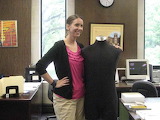The only drawback is that when I don't have something planned to do within a large block of free time I have the tendency to do nothing. I don't want to sit on my butt watching daytime television every Friday afternoon this summer so I needed a plan.
In comes my buddy Shonna who is a teacher and has the summer off. She and I got to talking and decided that we needed to devote our Fridays to going out (or staying in) and doing something fun. We're calling them Friday Fun Adventures, or something like that, we haven't quite solidified the title yet. And really, what's in a name? They're going to be fun no matter what we call them.
Here's my brainstorm list so far:
* Watch Season One (or more) of Doctor Who
* Visit Used (and New) Bookstores in Chicago
* Hancock Observatory / Willis Tower Skydeck - somewhere high with a view
* Taste of Chicago
* Museum of Contemporary Art
* Wicker Park / Bucktown Shopping
* Science Storms at the Museum of Science and Industry
* LOTR Marathon
* Indoor Game Day
* Lincoln Park Zoo
If we do half of this list it will be an amazing summer.
 A couple of things:
A couple of things:1) If you know of a fun Chicago thing (restaurant, art gallery, store, whatever) that you recommend we add to the list, let me know.
2) If you see something on this list that you would like to do and want to come to Chicagoland to hang out with me and participate in a Friday Fun Adventure Day, please let me know. The more the merrier.
"In winter I get up at night
And dress by yellow candle-light.
In summer, quite the other way,
I have to go to bed by day."
- Robert Louis Stevenson
Here's to longer days and Funner Fridays!!



 Fred
Fred


